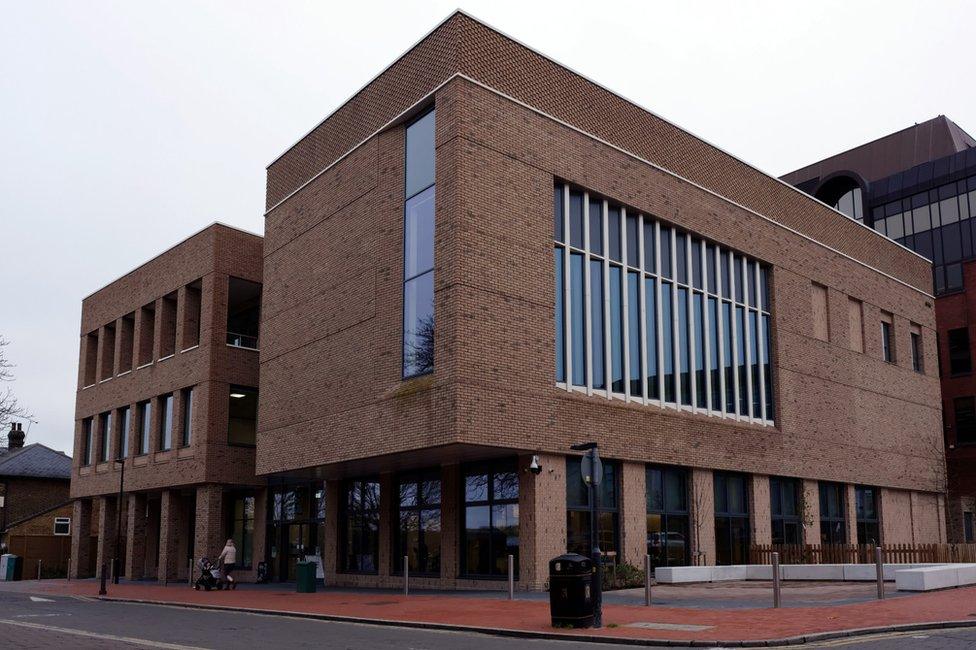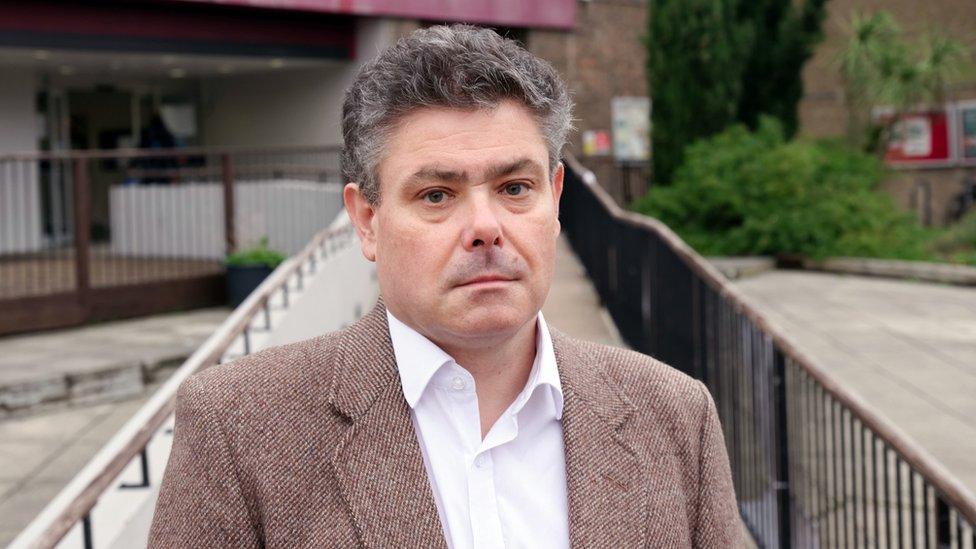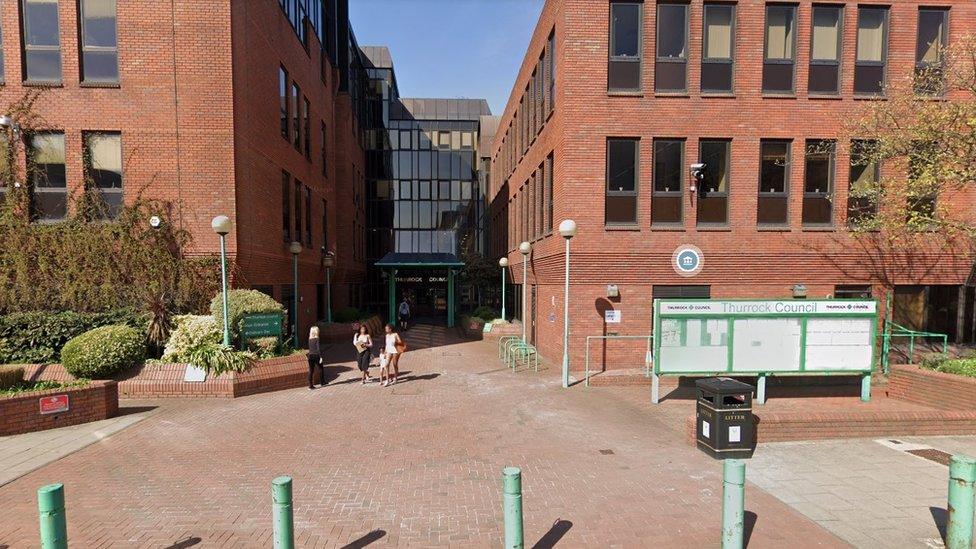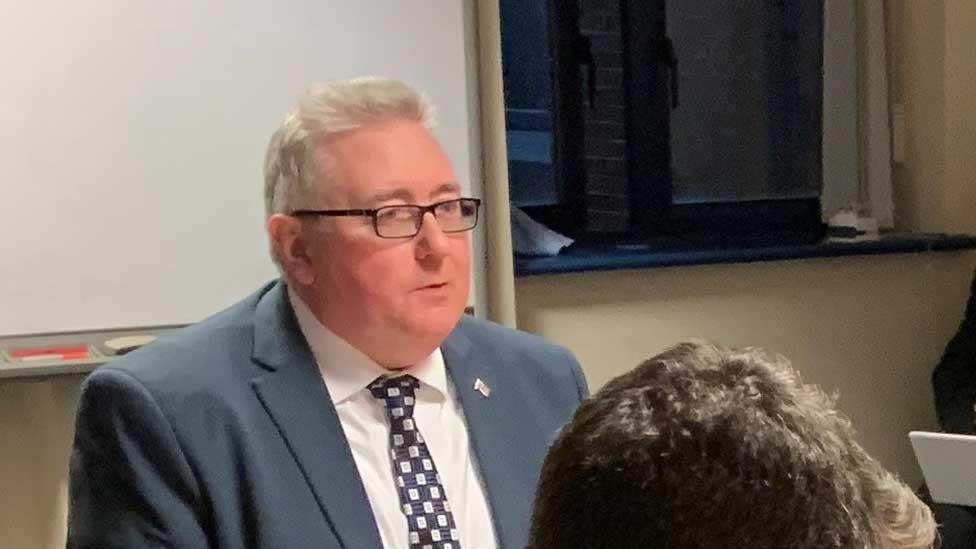Thurrock Council reveals 'grave' £469m hole in its budget
- Published

The Conservative-run Thurrock Council admitted £275m of taxpayers' money would be lost as a direct result of investments
A council has admitted a series of failed investments has led to a £469m budget black hole - one of the largest ever reported by a UK local authority.
In a report published on Tuesday, the Conservative-run Thurrock Council admitted £275m of taxpayers' money will be lost as a direct result.
The £469m funding gap is about three times the authority's annual budget.
Thurrock Council said the council now needed "exceptional financial support" from government.
As well as revealing the current £469m shortfall in the budget, the Essex authority also provided an update about its investments.
The council said investments worth about £275m had to be "written down" which, a spokesman for the council confirmed, meant the money had effectively been lost.
In his report, Jonathan Wilson, the council's interim head of finance, warned the council that "the total projected funding gap is so significant that the council cannot deliver a balanced budget in 2022/23 within existing resources".
Significant cuts
Describing the council's financial position as "grave", Mr Wilson said the authority would "urgently seek exceptional financial support from government alongside taking action to reduce its expenditure".
The report urges the council to focus on the "core" services it is obliged to supply by law, to fund only essential spend and make "significant" cuts.
The council, which serves a population of about 174,500, will also have to sell assets, the report states.
Thurrock Council is seeking "exceptional financial support" from government
Thurrock Council's investments were intended to make money to pay for services but it has been reported recently that they made losses.
About three quarters of of the authority's investments, which have a book value of more than £1bn, were "high value and high-risk", the report states.
The council said four of its investments were "subject to significant impairment". The authority did not disclose which investments these were but said more information would be provided to the council's members in "due course".
Mark Coxshall, leader of Thurrock Council, said: "At the moment, we are £470m in debt which we can't cover and that is why we are needing to move for exceptional financial support from the government.
"It's a very large figure and I understand that."
He added: "These are shocking numbers but the first stage to creating a good plan for recovery is to understand the full extent of the problem."

John Kent, leader of the Labour group on the council, described the financial position as "catastrophic"
John Kent, leader of the Labour group on the council, said: "This is absolutely catastrophic.
"As always it is the men, women and children that live and work in Thurrock who will suffer as a result of the council's negligence over the past six years."
He said he feared for the future of the Thameside Theatre, allotments and the library as the council seeks to reduce its spending and make money.
"Services will be pared to the bone," he said.
A spokesperson for the Department for Levelling Up, Housing and Communities said: "We are aware of the serious ongoing concerns about the financial management of Thurrock Council.
"Ministers have already appointed Essex County Council to the role of Commissioner and Best Value Inspector, giving them full control of the financial functions of Thurrock Council and powers to assess whether there are wider failures."
The government added it would "not hesitate to take further action" if needed.

Prof Tony Travers, of the London School of Economics and Political Science
Thurrock's financial position is dire. It now rivals Slough in terms of the sheer scale of the problems it faces.
Thurrock has made investments which have performed so badly they are now having to be 'written off', which means its day-to-day budget will have to absorb losses of several hundred million pounds.
Bankruptcy is unthinkable, so central government will have to allow the council to borrow money over several years so as to protect spending on social care, refuse collection, roads and libraries.
Higher council taxes and a squeeze of spending will probably be needed to help pay off the borrowing.

Additional reporting by Mariam Issimdar

Find BBC News: East of England on Facebook, external, Instagram, external and Twitter, external. If you have a story suggestion email eastofenglandnews@bbc.co.uk, external
Related topics
- Published5 October 2022

- Published2 September 2022
